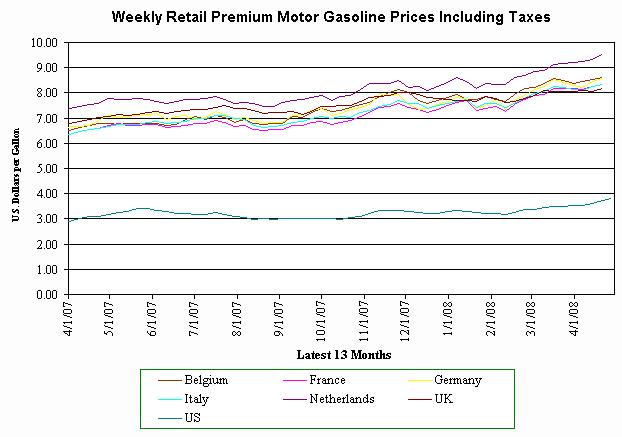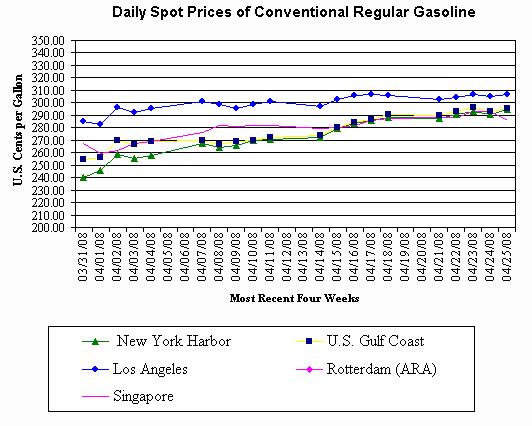Cognitive Dissonance
As a follow-up to this post on gas-price demagoguery, I would like to observe that the very same people who are most likely to demagogue about high gas prices in this country are the very same ones who advocate that the US adopt European-style taxation levels, regulatory policy, and CO2 targets, the results of which can be seen here:
If you can't read the colors on the scale well, I think you can guess which is the US price line and which are the European gas prices. Source here. Just to be clear, this has nothing to do with wholesale gasoline prices, which are substantially similar between the US and Europe:
Since the difference in price does not go to the producer, I will leave it as an exercise to guess where the extra $5 per gallon is going (hint: Uncle Francois) The cognitive dissonance required to call for 80% CO2 reductions while simultaneously decrying $3.50 gas prices is just stunning to me.
Update: From the same source, here are the gas prices in dollars per US gallon EXCLUDING taxes:
| Date | Belgium | France | Germany | Italy | Nthrlnds | UK | US |
| 4/14/2008 | 3.32 | 3.28 | 3.18 | 3.61 | 3.85 | 3.09 | 3.21 |
Update #2: More here on Hillary's sleight of hand. And this from Robert Samuelson, at how this cognitive dissonance extends to exploration limits:
We could be producing more, but Congress has put large areas of
potential supply off-limits. These include the Atlantic and Pacific
coasts and parts of Alaska and the Gulf of Mexico.
By government estimates, these areas may contain 25 billion to 30
billion barrels of oil (against about 30 billion barrels of proven U.S.
reserves today) and 80 trillion cubic feet or more of natural gas
(compared with about 200 tcf of proven reserves).What keeps these areas closed are exaggerated environmental fears,
strong prejudice against oil companies and sheer stupidity. Americans
favor both "energy independence" and cheap fuel. They deplore imports
-- who wants to pay foreigners? -- but oppose more production in the
United States. Got it? The result is a "no-pain energy agenda that
sounds appealing but has no basis in reality," writes Robert Bryce in
"Gusher of Lies: The Dangerous Delusions of 'Energy Independence.' "


I don't understand what is so stunning about cognitive dissonance. Everyday, everyone makes decisions that tend to have some level of cognitive dissonance. The person who likes dolphins, or at least doesn't have anything against dolphins, is going to be the same person who buys the cheapest tuna that were caught with dolphin killing nets. A woman who hates her husband for either cheating or beating will stay with him. A man who loves his wife can continue cheating on her. The non-racist is going to conform to the Nazi state. The average American can kill and eat cows, pigs, lambs, deer, geese, and other potentially cute creatures but will grimace in the face of eating dogs (don't give me that "man's best friend" junk). The same America that hates foreign companies from entering their economy will cheer as American companies wiggle their way into foreign markets. The average student will hate going to school, but go anyway. The average worker hate their work but work anyway. Of course, we all give rationale to our decisions. A person's has to earn money for themselves to live, right? Yes, but there are many examples of people who are not forced to work in an office or wherever you hate to work and still live happily. A person has to go to school to have a bright future, right? Yes, but there are many counter examples. The world is a realist world and therefore America must break into whatever markets it can while preventing others from coming in, right? Perhaps, but that is just a theory and rationale for your decisions, there is no "must" in such schizophrenic sentiments.
I can go on for a while about common cases of cognitive dissonance. Cognitive dissonance is not an "OMG IRRATIONAL" phenomenon. Many people are forced by circumstance to make such schizophrenic decisions daily. You should do some research into psychology and economics before using such self important vocabulary.
You have to keep in mind that humans are RATIONALIZING creatures and not RATIONAL creatures. If we were rational creatures, we would be gods, able to view the universe in one,objective, consistent vision. As it were, we are rationalizing creatures who try to give reason to their actions and actions of others. This is not by chance, but due to such cognitive dissonance decisions that we are forced to make daily, we have developed reasons for doing so in order for our brains to digest without breaking it as a logic machine.
One. I don't think that the same people that demagogue about high gas prices are the same who want to increase gas taxes. Show me the proof of that. Oh, that's right, there's none. Why is so? Because the people that want the gas tax to rise are the same that want less gas to be used in the US, by the means of rising prices, not the other way around. If you find some jerk that somehow put these two ideas in his own brain at the same time, congratulations, you have just lost your time hunting down a moron.
Two. The "Results" that you render are meaningless from the point of view of the consumer. Yes, that's right. And you know why? Because the europeans spend half of the gasoline that americans do. That means that for every consumer, we europeans spend exactly the same amount that you do, BUT 50% of what we pay doesn't go to a foreign country, rather it goes directly to the government to pay for road building, maintenance, bridge building, etc.
Three. Yes, I know what you're thinking, "that's bad" because people will have less money to spend in other things, so they can't improve economy. Well, I also like the small government point of view, but this is not a simple commodity, we are talking about a fossil-fuel commodity that is struggling to increase output, while demand soars. Anything that creates a virtual scarcity on the market signal (a tax) will improve the consumer's time to adapt to a new circumstance. If oil does get to impossible all new time highs, then who will, in your opinion be the most capable to cope with price problems?
a) A mal adapted US which consumes far too much because of a wide suburban sprawl (created by a too cheap gas)
b) an adapted EU which consumes less and if trouble sets in, governments can choose to downgrade gracefully the taxes, rendering the increase of prices almost null?
It's not even academics. I live in Portugal and I used to spend 1.2 euros per liter two years ago. Today, it rose to unprecedented levels of... 1.4 euros. Meanwhile, american prices rose what? 70% 80%? And it didn't even took government lowering taxes.
Good fortune with your oh so great no taxed gasoline! Ahah!